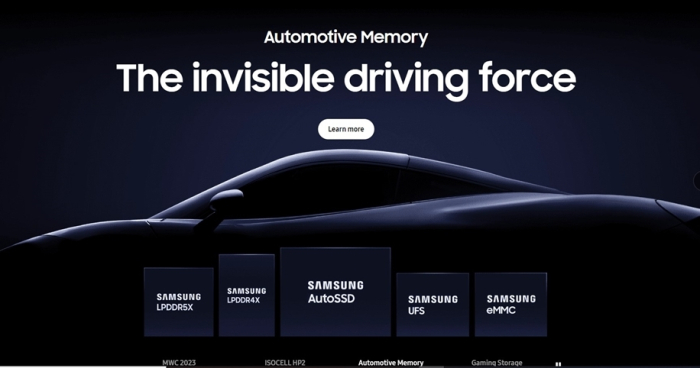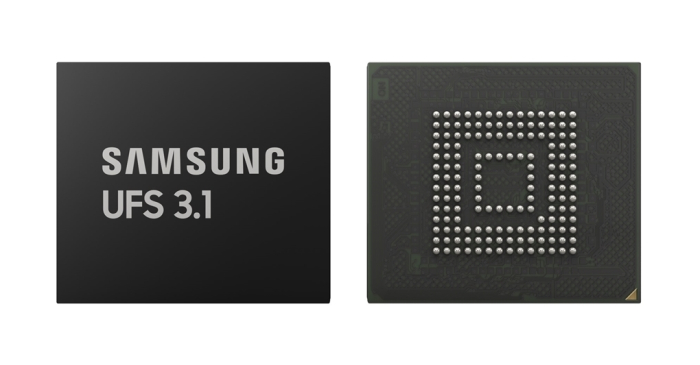Samsung Electronics Co., the world’s largest memory chipmaker, has begun mass production of its latest flash memory chip, which the company said is optimized for in-vehicle infotainment (IVI) systems.
The automotive chip, Universal Flash Storage (UFS) 3.1, offers the industry’s lowest power consumption, the South Korean tech giant said on Thursday.
With the latest vehicle chip, Samsung aims to overtake Micron Technology Inc., the current market leader, by 2025.
The new flash memory will come in three capacity types – 128, 256 and 512 gigabyte (GB) variants – to meet different customer needs, Samsung said.
The 256 GB model has reduced its energy consumption by about a third compared with its previous generation product, the company said.
The 256 GB chip offers a sequential write speed of 700 megabytes per second (MB/s) and a sequential read speed of 2,000 MB/s, it said.

“The new UFS 3.1 chip addresses a wide range of customer needs for optimized IVI systems. It also complies with the new memory trend that requires higher ESG standards,” said Cho Hyun-duk, vice president of Samsung’s memory product planning team.
“We aim to expand our presence in the automotive semiconductor market with the introduction of our UFS 3.1 solution for advanced driver assistance systems (ADAS).”
TO SUPPLY AUTOMAKERS BY YEAR’S END
Samsung said it plans to start supplying UFS 3.1 products to global automakers and parts manufacturers by the end of this year.
The mass production of UFS 3.1 chips with 512 GB capacity will begin in the fourth quarter.
The latest auto chip meets the requirements of AEC-Q 100 Grade 2, a semiconductor quality standard for vehicles, which guarantees stable performance in temperatures between minus 40 degrees Celsius and 105 degrees Celsius, the company said.

As Samsung continues to strengthen its automotive memory portfolio, the company received an ASPICE Level 2 certification from customers in April. Earlier this month, it also received certification from C&BIS, a renowned automobile verification agency, for the UFS 3.1 chip’s performance stability.
HIGH-TECH AUTO CHIP LINEUP
Since Samsung entered the automotive memory chip business in 2015, the company has been strengthening its high-tech chip lineup as global carmakers are rapidly adopting autonomous and IVI systems, which has upped the demand for advanced auto chips.
In 2017, Samsung unveiled the industry’s first UFS for vehicles and has since been providing various vehicle memory chips such as AutoSSD, Auto LPDDR5X and Auto GDDR6.

An electric vehicle usually requires about 1,000 chips compared with 200-300 chips per vehicle for the current human driving models. A self-driving car needs at least 2,000 automotive chips.
According to market research firm Omdia, the global auto chip market is forecast to grow from $63.5 billion in 2022 to $96.2 billion by 2026.
“We aim to become the world’s No. 1 automotive chipmaker by 2025 through the development of vehicle memory solutions optimized for customers,” said a Samsung official.
SAMSUNG’S CLIENTS
In November 2021, Samsung supplied the Exynos Auto V7 to Volkswagen AG for the German carmaker’s IVI system, Car Application Server (ICAS) 3.1, developed by LG Electronics Inc. It supplied the Exynos Auto 8890 processor chip and the Exynos Auto V9 to Germany’s Audi AG.
Sources said Samsung is also developing Tesla Inc.’s next-generation hardware 4 (HW4.0) chip for its full self-driving (FSD) cars.
Earlier this month, the Korean chipmaker said it would supply the Exynos Auto V920 chip to Hyundai Motor Co. to support the carmaker’s advanced features in its IVI systems.
https://amp.kedglobal.com/newsAmp/ked202307130015





